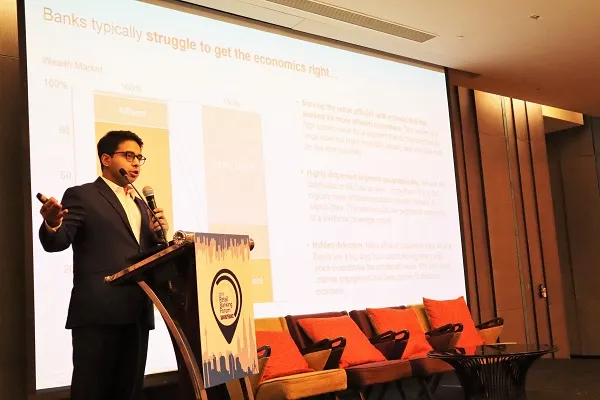
How Thai lenders are building the bank branch of the future
Paperless applications and facial recognition tech for eKYC are key components.
Banks in Thailand are fast-tracking the transformation of the look and feel of their brick-and-mortar branches to survive ASEAN’s push for digital integration.
At the Bangkok Leg of the 2019 Asian Banking & Finance Retail Banking Forum, more than 50 bankers, industry players and speakers flying as far as Astonia, exchanged ideas on how the bank branch model should evolve in response to changing customer mindsets.
Data from the World Bank and Deloitte found that whilst Thailand is still heavily reliant on physical bank branches for day-to-day operations, it has one of the highest digital interactions at 73%, compared to the US (46%) and Singapore (66%).
Arapat Sangkharat, EVP, Transformation at Krungthai Bank, highlighted that branch strategy must be defined in the context of the overall customer and channel strategy. Although bank branches used to serve clients to make simple transactions, they have evolved to take on advisory roles and focus on sales beyond day-to-day business deals.
He noted how more and more banks are revamping their branches to not just look more like a retail store, but to entice clients to come in and boost footfall. These ‘transformed’ branches feature more personalised services with the help of technologies such as facial recognition and eKYC but still leave room to integrate human touch to cater to those who require more than robo-advisory.
“Before we close down branches, we first need to make sure that they are operating efficiently. Only then can we migrate customers out and look into what to do next,” Sangkharat said.
This was echoed by Sasapak Kiatsommart, team head of retail marketing management - bancassurance and mutual fund at TMB Bank. Although branches are necessary to keep their presence on the forefront of people’s minds, it all really boils down to the efficiency of their services.
“People still go to branches not because they want to, but because they have to, to open accounts and apply for loans,” she explained. “The number of bank branches we need to cover Thailand depends on how we define the journey of the banking systems. It also depends on what kind of transactions and services we want to offer.”
Given that not every customer has a passport as identification in opening accounts, alternative solutions have been used such as facial recognition technology and national IDs to use in omni-blockchain cross referencing with other banks, as well as to lessen the need for clients to physically appear at branches for identity verification, according to Sam Tanskul, managing director at Krungsri Finnovate and head of innovation and fintech Krungsri consumer at Krungsri Bank.
Digital is not everything
The rapid digitisation of the banking sector, however, risks deepening the digital divide, suggests Chris Jenkins, COO of Thailand and GMS representative offices at Standard Chartered. He pointed out how in the UK, the advent of digital banking left a lot of people unbanked and resulted in a backlash as a lot of people could not easily afford and access the technology. He highlighted that whilst banks still need to progress to paperless and move forward with their digital ambitions, they should not completely phase out human touch points.
Avishek Nandy, principal for Bain & Company, further highlighted that the idea of going digital needs to be clarified in a way that it is helping human touch points at banks, rather than replacing them. He noted how banks need to dial back on their desire to please customers and prioritise their respective advisory aspects and banking capabilities.
Nandy added that the mass affluent segment, both in Thailand and the region, are underserved and not well understood, with about 48% of clients not receiving financial advice. He further noted that around 40% of affluent customers who use certain banks as their primary banks still shop elsewhere for other services such as insurance.
“Banks focus so much on the digital aspect but underestimate the value of the other pieces of the puzzle around it such as human touchpoints, products and value proposition, and ambition and business model. At some point customers will want to talk to someone, as it’s not easy to rely on a digital advisor,” he said. “Contrary to popular belief, the segment is not 100% ready for digital.”
Part and parcel of the ongoing digital transformation of banks in Thailand owe itself to heightened collaboration with fintechs, according to Nam Soon Liew, managing partner for ASEAN markets at Ernst & Young (EY).
EY’s data showed that in 2017, there were over 128 fintechs in Thailand, with a total of $12m fintech investments. A third (33%) of fintechs focused on payment solutions, followed by loan application and financing (25%) and money transfers/remittances (21%). That said, Thailand ranked as the second hardest country in finding venture capital after the Philippines.
“It is still difficult to get money despite a lot of venture capital (VC) firms here and progressive regulations,” Liew explained. “There’s also no point in setting up another ecosystem if you cannot get the customers. Everyone’s eating the same person’s lunch, so we need to differentiate and figure out where the money is.”
Kersten Eero, senior business development manager for Big Data Scoring, agreed, noting that whilst Thailand’s fintech capability is strong, it remains lacking given the insufficient focus on digital financing. He projected that non-financial fintechs will continue to gain traction, with more convergence expected in the next few years.
The Kuala Lumpur Leg of the ABF Retail Banking Forum was held on 16 May 2019 at Doubletree by Hilton, Malaysia. For inquiries, please email [email protected].



















 Advertise
Advertise













